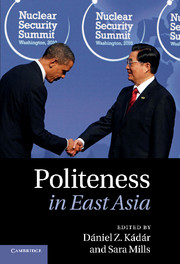Book contents
- Frontmatter
- Contents
- Notes on contributors
- Foreword
- Acknowledgements
- Abbreviations
- 1 Introduction
- Part I Politeness in East Asia: Theory
- Part II Politeness in East Asia: Practice
- 6 Politeness in China
- 7 Politeness in Japan
- 8 Politeness in Korea
- 9 Politeness in Vietnam
- 10 Politeness in Singapore
- 11 Epilogue: Culture and norms in politeness research
- Notes
- Bibliography
- Index
9 - Politeness in Vietnam
from Part II - Politeness in East Asia: Practice
Published online by Cambridge University Press: 07 September 2011
- Frontmatter
- Contents
- Notes on contributors
- Foreword
- Acknowledgements
- Abbreviations
- 1 Introduction
- Part I Politeness in East Asia: Theory
- Part II Politeness in East Asia: Practice
- 6 Politeness in China
- 7 Politeness in Japan
- 8 Politeness in Korea
- 9 Politeness in Vietnam
- 10 Politeness in Singapore
- 11 Epilogue: Culture and norms in politeness research
- Notes
- Bibliography
- Index
Summary
Introduction
The present chapter explores politeness in Vietnam. Discursive approaches stress the fact that a wide variety of communicative styles, representing regional, class, age and gender groupings, exist in Vietnam; however, in the present chapter I focus on Vietnamese politeness primarily but not exclusively from the ‘standard’ lens, due to limitations on space. Such a general overview is justifiable all the more because Vietnamese politeness has not been adequately discussed in the politeness research literature. The aim of this chapter is thus to examine what constitutes standard polite behaviour and perceptions in Vietnam by tracing their historical ideological origins and describing some common modern-day examples which reflect deviations from normative politeness ideals and norms. Whilst focusing on normative politeness, I will also touch upon some non-linguistic and paralinguistic aspects of politeness behaviour that distinctly reflect differences in Vietnamese and non-Vietnamese behaviour and perceptions and that also have hitherto been neglected in politeness research.
I will present two broad ideological issues: the perceptions of ‘politeness under the old regime’, and the association of current politeness and rural migrants (see the discussion on Crude ‘country bumpkins’ in Section 9.3.1). As early publications in southern Vietnam relating to politeness are extant, complete and accessible, these sources will be used. They are:
late nineteenth- and early twentieth-century publications dating from the colonial era during the Nguyễn dynasty (1802–1945) when the imperial court resided in Hue (Central Vietnam); special attention is devoted to works on politeness by native scholars such as Trương Vĩnh-Ký (1837–98), the bishop and writer Hồ Ngọc Cẩn (1876–1948), and Ngô Đình Khả (1850–1925); and
archival materials, e.g., Personal Response Project Resource Materials (PRP) and Bulletin of the Bureau of School Service (Bulletin BSS), published and/or used by the American army in the 1960s–1970s, available at Texas Tech University Vietnam Archive.
Additionally, the works of Vietnamese scholars and writers such as D. H. Nguyễn (1956), H. V. Luong (1987, 1990) and T. T. H. Vu (1997) on the Vietnamese address system, politeness and language respectively will be consulted. I also draw on personal data obtained from email sources.
- Type
- Chapter
- Information
- Politeness in East Asia , pp. 208 - 225Publisher: Cambridge University PressPrint publication year: 2011
- 6
- Cited by



